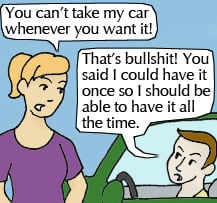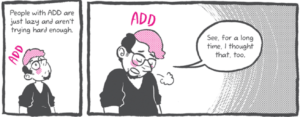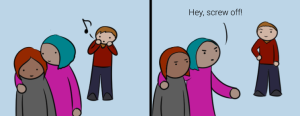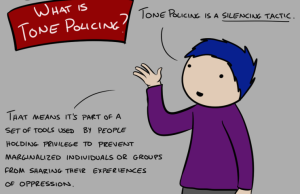
Source: Huffington Post
As I’ve written about before, break-ups suck. A lot. And they can take a long time to heal from (and I mean a long time, but we’ll get to that later).
Feminism, depending on how you and those you surround yourself with practice it, can sometimes complicate this process a little bit more.
After all, how quote-unquote “feminist” does it feel to be temporarily obsessed (literally) with another person? That feels a little bit objectifying at best and full on stalkerish (again, literally) at worst.
And patriarchy (by way of traditional gender expectations) only makes it worse. (What doesn’t patriarchy make worse?)
For example, one time after a break-up, my mom suggested that I slow my professional and academic roll because being career-focused and increasingly sapiosexual was, apparently, forcing me to hold standards that were too unrealistic.
And, besides, she argued, wasn’t I getting a little too old for this? Wasn’t it about time to settle? (And no, the irony of using the word “settle” to mean both “settling down” and “settling for” is not lost on me.)
Like, on top of daily crying fits and that nagging feeling that your friends really don’t want to see any more old pictures of you and your ex together accompanied by this emoji, we have to be reminded that we’re #foreveralone, too?
But I think that one of the most beautiful and meaningful things that feminism gives us is the revolutionary practice of self-care as a vehicle toward self-acceptance.
However, it’s hard to practice feminism if you don’t first understand your inner workings, if you’re not actively compassionate with yourself – and that includes during a break-up.
So, as somewhat of a miserable companion to my article on the neurobiology of falling in love, here is what you need to know about what’s happening with your brain chemistry during a break-up and how best to nurture yourself over the process
But first: Let’s talk about hormones. And here’s a handy dandy representation that I made for you:

That’s rad, yeah?
So, these are the four hormones that are important in attempting to understand love (and our want of it). In the most basic sense:
- Cortisol is a stress hormone
- Dopamine seeks out pleasure
- Norepinephrine makes you highly excitable
- Serotonin is a mood stabilizer
When you’re going through a break-up, your serotonin drops as your cortisol increases, which makes your brain pump out dopamine, which produces norepinephrine.
In other words, when you’re in the process of trying to get over someone, all of the hormones that make you anxious and energetic are high, and the one that keeps you stable is low.
Do you see where I’m going with this?
Good. Now let’s go.
1. Frustration
Technically, there are two stages in what scientists have dubbed “love rejection” (which somehow actually sounds worse than “break-up” or the ever-romantic “unrequited love”). The first is “Protest”.
But within the stage of Protest is the feeling of frustration, and not the kind of anger-frustration you feel toward MRA trolls, but more like the feeling of being fussy and unfulfilled.
And this has a lot to do with the activation of your caudate nucleus – the part of your brain that controls cognitive functions like goal-directed action, memory, sleep, and emotion.
At this point, you’ve got high levels of dopamine and norepinephrine pumping through your system – and while those hormones can make you feel good when the pleasure they’re seeking is fulfilled, they’re going to make you feel really bad when you end up not getting what you’re looking for.
This is the point at which you might be feeling intensely restless and nostalgic – lying in bed, scrolling through old text messages because you can’t sleep.
You may also be what we call “reunion obsessed” – and you know exactly what that means, don’t you?
Luckily, Taylor Swift wrote a song about this stage to normalize it all for us: It’s when you spend a lot of time fantasizing about them showing up at your doorstep all, “Baby, I’m sorry, I’ll change, I love you” and you can’t, for the life of you, remember a single flaw of theirs.
This is when you may find yourself doing a lot of letter writing and pleading of your own.
Basically, you’ve got a whole lot of energy to wear out, but you can only stay focused on one thing: your lost love.
Suggestions for Self-Care
- Keep a journal where you can record everything you wish you could say to them
- Go ahead and write those long, kind of pathetic e-mails – but send them to yourself
- Take up a new hobby or focus on something else that you enjoy to distract your attention
- Soothe yourself with scents like vanilla, lavender, and jasmine to help you relax
- Let yourself power down for awhile before bed so you can sleep better (I once heard Janet Mock say that she shuts off her cell phone at 8pm – and I trust anything Janet Mock says)
2. Panic
I once broke up with someone for a really bad reason – I don’t want to get into it – and started to feel really regretful afterward, but he wouldn’t pick up the phone.
My mom – because I guess she wanted me to be a creepy weirdo – suggested that I just go to his house to apologize instead of calling him over and over again.
I said, “He doesn’t even love me anymore.”
She said, “Melissa, someone doesn’t stop loving you in three days.”
Touché.
But in my absolute panic that he would eventually stop loving me and that (oh my God) then I’d never get another chance and what-if-this-is-the-last-person-who-will-ever-love-me and shit-I-made-the-biggest-mistake-of-my-life, I did go to his house.
(For the record, in this particular instance, it worked out. I threw rocks at his window until he looked out to find me standing there, and when he came down the stairs, I jumped into his arms crying, “I’m sorry! I love you!” I’m pretty sure that when we kissed, it was in slow motion, and I could’ve sworn I heard “Take My Breath Away” playing somewhere in the distance.)
That stress-induced panic is real.
And the reason why?
Your cortisol levels shoot up – which only produces more dopamine and norepinephrine. So now, not only are you stressed the fuck out, but you’re even more pleasure-seeking.
Basically, you’re strung-out.
And as the panic sets in that you’re probably never going to have access to this particular addiction again (and, yes, love behaves similarly to addiction in the brain), you become more and more willing to test the limits of your good judgment – and unable to draw clear lines between appropriate and inappropriate behavior.
Suggestions for Self-Care
- What makes you feel calm, cool, and collected? Is it tea? yoga? your “Ambient Radio” station on Pandora? Practice that.
- Get a massage
- Connect with nature
- Do what feels right for your body in terms of nutrition and physical activity
- Try breathing exercises or other meditative practices
3. Rage
Okay, this sounds a lot scarier than it actually is, but it can get scary.
Think of this as the “Anger” phase in the stages of grief. Anger is a normal, healthy emotion to feel, so long as you deal with it in an appropriate manner.
And if it makes you feel any better, know that this is the stage that I have the hardest time with. This is when I get stuck and cave.
I have a really hard time sitting with anger (hey, at least I’m self-aware), and this is the point in the break-up/moving-on process when I’ll call them. Because I just don’t want to be mad anymore.
But the reason why you feel rage is because your amygdala is activated – and this part of the brain plays a primary role in the processing of memory, decision-making, and emotional reactions.
At this point, your levels of serotonin drop rapidly, and they drop hard.
And because serotonin controls obsessive-compulsive impulses, this can get really, really dangerous if someone is inclined toward violence.
In general, for most people, low levels of serotonin mean obsessive thoughts (maybe no matter what you do, you can’t focus on anything else; maybe you start thinking you’re seeing your ex in every crowd) and maybe some compulsive behavior (the casual drive-by-just-to-see-if-their-lights-are-on or finally caving and reading through their Twitter feed, especially their mentions to see if they’ve been flirting).
But for others, this kind of imbalance can cause violently impulsive behavior, like stalking, jealous rages, and even attacks.
And that’s worth your understanding about yourself — for your own safety.
The most dangerous times for a person leaving an abusive relationship, for example, include up to 24 months after they leave and when they start dating a new partner. And when I say “most dangerous times,” I mean “times they’re most likely to be killed.”
This brain chemistry issue is part of that.
Weirdly enough, it also suppresses your immune system, so you’re more susceptible to symptoms like sore throats and colds. *shrug*
Suggestions for Self-Care
- Smile – shockingly, it actually works to stimulate dopamine
- Get some sunlight – it stimulates your pineal gland, which helps you sleep, and increases your serotonin levels
- If you have access to talk therapy, now might be a good time for it
- Try selective serotonin reuptake inhibitor (SSRI) anti-depressants – even a low dosage – because they curb obsessive thoughts
- And—uh—take zinc supplements, apparently!
4. Despair
Despair is the noun that causes the adjective “desperate”, and I’d wager that we’ve all felt some kind of desperate after a break-up. If it’s any consolation, at least it’s normal.
When you’re in a state of despair, it’s because you’re experiencing very low levels of dopamine, norepinephrine, and serotonin – all of which is associated with depression.
And after a break-up, 40% of people experience moderate depressive symptoms, and 12% of people experience severe ones. And this leaves people three-to-four times more likely to commit suicide – especially if they lack support systems.
And this despair shows up differently for everyone.
According to research, cis men are more likely to use alcohol and drugs during this time and to engage in other reckless behavior.
Cis women, on the other hand, are prone to sobbing (psh, you’re tellin’ me!), withdrawing socially, and (my personal favorite) retelling the story over. And over. And over again.
Have you ever accidentally sat down beside that post-break-up mess of a person at a party, and next thing you know, you know the entire story of their failed romance? Yeah.
This is an incredibly difficult place to be – whether you’re the one suffering or someone trying to support a loved one.
And it’s okay to feel that. Some of the best advice I’ve ever gotten in my life is to allow myself to feel my feelings.
Just make sure that you have a solid support system in place.
Suggestions for Self-Care
- If you haven’t started talk therapy yet, there’s no better time than the present
- You can also lean on friends who are good listeners
- It’s one thing to be naturally introverted; it’s another to withdraw – so make sure that you’re making time for activities and people that you enjoy. Think: Who, what, and where makes you feel safe?
- If you’re feeling like your emotional state is affecting your day-to-day life, always remember that medication is an option
- Keep the National Suicide Prevention Line number close by; in the US, it’s 1.800.273.TALK
5. Resignation
At some point, you come to a state of accepting the undesirable, but inevitable: You and your partner are no longer — well — you and your partner.
Your neurobiology at the time of a break-up is in a state of disarray. Your hormones are all over the place. It’s kind of like reliving puberty – and no one wants that. But eventually, your body reaches homeostasis again. Sooner or later, you achieve balance.
The bad news is that, according to research by Helen Fisher, it can take 18-24 months to heal fully from love rejection – but the pain does subside, time does heal, and brain chemicals do return to normal.
***
Break-ups are the worst. At least, when you’re going through it, it feels like nothing else could be as terrible. But those feelings of frustration, panic, rage, and despair will not last forever.
They will pass, and you will love again.
You’ll get through it. Trust me.
[do_widget id=”text-101″]
Melissa A. Fabello, Co-Managing Editor of Everyday Feminism, is a sexuality educator, eating disorder and body image activist, and media literacy vlogger based out of Philadelphia. She enjoys rainy days, Jurassic Park, and the occasional Taylor Swift song, and can be found on YouTube and Tumblr. She can be reached on Twitter @fyeahmfabello. Read her articles here and book her for speaking engagements here.
Search our 3000+ articles!
Read our articles about:
Our online racial justice training
Used by hundreds of universities, non-profits, and businesses.
Click to learn more




















